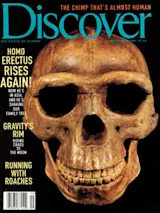In which the ghost of that oft-reviled ancestor, Jean-Baptiste Lamarck, returns to trouble the sleep of neo-Darwinian evolutionists.
To most evolutionary biologists, directed mutation is an oxymoron. Mutations, according to evolutionary theory, are random events-- changes in an organism’s genetic makeup that have no particular direction, and that may be harmful or beneficial. Whatever direction is to be found in evolution is put there by natural selection. When a mutation happens to be beneficial--when it improves the organism’s chances of producing offspring- -it survives, whereas harmful mutations die out. That is the essence of neo-Darwinism, a theory in which there is no room for directed mutation.
Historically, though, there was an alternative theory: Lamarckism, named for Jean-Baptiste Lamarck, the nineteenth-century Frenchman who was the first person to articulate the idea that organisms evolve. Although Lamarck knew nothing of genes or mutations, he did believe that organisms direct their own evolution--that ...














